- Home
- Haruki Murakami
Sputnik Sweetheart Page 8
Sputnik Sweetheart Read online
Page 8
Was I really going to get on a plane and fly all the way to Greece?
The answer was yes. I had no other choice.
I pulled a large world atlas down from my bookshelf to locate the island Miu had told me about. It was near Rhodes, she’d said, but it was no easy task to find it among the myriad islands that dotted the Aegean. Finally, though, I was able to spot, in tiny print, the name of the place I was looking for. A small island near the Turkish border. So small you couldn’t really tell its shape.
I pulled my passport out of a drawer and checked that it was still valid. Next I gathered all the cash I had in the house and stuffed it into my wallet. It didn’t amount to much, but I could withdraw more from the bank in the morning. I had some money in a savings account and had barely touched my summer bonus. That and my credit card and I should be able to come up with enough for a round-trip ticket to Greece. I packed some clothes in a vinyl gym bag and tossed in a toilet kit. And two Joseph Conrad novels I’d been meaning to reread. I hesitated about packing a swimsuit and ended up taking it. Maybe I’d get there and whatever problem there was would be solved, everybody healthy and happy, the sun hanging peacefully in the sky, and I’d enjoy a leisurely swim or two before I had to come home. Which of course would be the best outcome for everyone involved.
Those things taken care of, I turned out the light, sunk my head back in the pillow, and tried to go back to sleep. It was just past three, and I could still catch a few winks before morning. But I couldn’t sleep. Memories of that harsh static lodged in my blood. Deep inside my head I could hear that man’s voice, barking out my name. I switched on the light, got out of bed again, went to the kitchen, made some iced tea, and drank it. And I replayed the entire conversation I’d had with Miu, every word in order. Her words were vague, abstract, full of ambiguities. But there were two facts in what she told me. I wrote them both down on a memo pad.
1. Something has happened to Sumire. But what’s happened, Miu doesn’t know.
2. I have to get there as soon as possible. Sumire, too, Miu thinks, wants me to do that.
I stared at the memo pad. And I underlined two phrases.
1. Something has happened to Sumire. But what’s happened, Miu doesn’t know.
2. I have to get there as soon as possible. Sumire, too, Miu thinks, wants me to do that.
I couldn’t imagine what had happened to Sumire on that small Greek island. But I was sure it had to be something bad. The question was, How bad? Until morning there wasn’t a thing I could do about it. I sat in my chair, feet propped up on the table, reading a book and waiting for the first light to show. It seemed to take forever.
At dawn I boarded the Chuo Line to Shinjuku, hopped aboard the Narita Express, and arrived at the airport. At nine I made the rounds of the airline ticket counters, only to learn there weren’t any nonstop flights between Narita and Athens. After a bit of trial and error I booked a business-class seat on the KLM flight to Amsterdam. I’d be able to change there for a flight to Athens. Then at Athens I’d take an Olympic Airways domestic flight to Rhodes. The KLM people made all the arrangements. As long as no problems arose, I should be able to make the two connections OK. It was the fastest way to get there. I had an open ticket for the return flight, and I could come back any time in the next three months. I paid by credit card. Any bags to check? they asked me. No, I replied.
I had time before my flight, so I had breakfast at the airport restaurant. I withdrew some cash from an ATM and bought traveler’s checks in U.S. dollars. Next I bought a guidebook to Greece in the bookstore. The name of the island Miu told me wasn’t in the little book, but I did need to get some information down about the country—the currency, the climate, the basics. Other than the history of ancient Greece and classical drama, there wasn’t much I knew about the place. About as much as I knew about the geography of Jupiter or the inner workings of a Ferrari’s cooling system. Not once in my life had I considered the possibility of going to Greece. At least not until 2:00 a.m. on that particular day.
Just before noon I phoned one of my fellow teachers. Something unfortunate has happened to a relative of mine, I told her, so I’ll be away from Tokyo for about a week, and I wonder if you’d take care of things at school until I get back. No problem, she replied. We’d helped each other out like this a number of times, it was no big deal. “Where are you going?” she asked me. “Shikoku,” I answered. I just couldn’t very well tell her I was heading off to Greece.
“I’m sorry to hear that,” she said. “Anyway, make sure you get back in time for the start of the new term. And pick up a souvenir for me if you can, OK?”
“Of course,” I said. I’d figure that one out later.
I went to the business-class lounge, sank into a sofa, and dozed for a bit, an unsettled sleep. The world had lost all sense of reality. Colors were unnatural, details crude. The background was papier-mâché, the stars made out of aluminum foil. You could see the glue and the heads of the nails holding it all together. Airport announcements flitted in and out of my consciousness. “All passengers on Air France flight 275, bound for Paris . . .” In the midst of this illogical dream—or uncertain wakefulness—I thought about Sumire. Like some documentary of ages past, fragments sprang to mind of the times and places we’d shared. In the bustle of the airport, passengers dashing here and there, the world I shared with Sumire seemed shabby, helpless, uncertain. Neither of us knew anything that really mattered, nor did we have the ability to rectify that. There was nothing solid we could depend on. We were nearly boundless zeros, just pitiful little beings swept from one kind of oblivion to another.
I woke in an unpleasant sweat, my shirt plastered to my chest. My body was listless, my legs swollen. I felt as if I’d swallowed an overcast sky whole. I must have looked pale. One of the lounge staff asked me worriedly if I was OK. “I’m all right,” I replied, “the heat’s just getting to me.” Would you like something cold to drink? she asked. I thought for a moment and asked for a beer. She brought me a chilled washcloth, a Heineken, and a bag of salted peanuts. After wiping my sweaty face and drinking half the beer, I felt better. And I could sleep a little.
The flight left Narita just about on time, taking the polar route to Amsterdam. I wanted to sleep some more, so I had a couple of whiskeys, and when I woke up I had a little dinner. I didn’t have much of an appetite, and skipped breakfast. I wanted to keep my mind a blank, so when I was awake I concentrated on reading Conrad.
In Amsterdam I changed planes, arrived in Athens, went to the domestic flight terminal, and, with barely a moment to spare, boarded the 727 bound for Rhodes. The plane was packed with an animated bunch of young people from every country imaginable. They were all tanned, dressed in T-shirts or tank tops and cutoff jeans. Most of the young men were growing beards (or maybe had forgotten to shave) and had disheveled hair pulled back in ponytails. Dressed in beige slacks, a white short-sleeve polo shirt, and a dark blue cotton jacket, I looked out of place. I’d even forgotten to bring any sunglasses. But who could blame me? Not too many hours before, I’d been in my apartment in Kunitachi worrying about what I should do with my garbage.
At the Rhodes airport I asked at the information desk where I could catch the ferry to the island. The ferry was in a harbor nearby. If I hurried, I might be able to make the evening ferry. “Isn’t it sold out sometimes?” I asked, just to be sure. The pointy-nosed woman of indeterminate age at the information counter frowned and waved her hand dismissively. “They can always make room for one more,” she replied. “It’s not an elevator.”
I flagged a cab and headed to the harbor. I’m in a hurry, I told the driver, but he didn’t seem to catch my meaning. The cab didn’t have any air-conditioning, and a hot, dusty wind blew in the open window. All the while, the cabdriver, in rough, stinky English, ran on and on with some gloomy diatribe about the Eurodollar. I made polite noises to show I was following, but I wasn’t really listening. Instead, I squinted at the bright Rhodes scenery passing b
y outside. The sky was cloudless, not a hint of rain. The sun baked the stone walls of the houses. A layer of dust covered the gnarled trees beside the road, and people sat in the shade of the trees or under open tents and gazed, almost silently, at the world. I began to wonder if I was in the right place. The gaudy signs in Greek letters, however, advertising cigarettes and ouzo and overflowing the road from the airport into town, told me that—sure enough—this was Greece.
The evening ferry was still in port. The ship was bigger than I’d imagined. In the stern was a space for transporting cars, and two medium-size trucks full of food and sundries and an old Peugeot sedan were already aboard, waiting for the ship to pull out of port. I bought a ticket and got on, and I’d barely taken a seat on a deck chair when the line to the dock was untied and the engines roared to life. I sighed and looked up at the sky. All I could do now was wait for the ship to take me where I was going.
I took off my sweaty, dusty cotton jacket, folded it, and stuffed it in my bag. It was 5:00 p.m., but the sun was still in the middle of the sky, its brightness overwhelming. The breeze blowing from the bow under the canvas awning wafted over me, and ever so slowly I began to feel calmer. The gloomy emotions that had swept through me in the lounge at the Narita airport had disappeared. Though there was still a bitter aftertaste.
There were only a few tourists on board, which clued me in that the island I was heading for was not such a popular vacation spot. The vast majority of passengers were locals, mainly old people who’d taken care of business on Rhodes and were heading home. Their purchases lay carefully at their feet, like fragile animals. The old people’s faces were all deeply etched with wrinkles, and deadpan, as if the overpowering sun and a lifetime of hard work had robbed them of any expression.
There were also a few young soldiers on board. And two hippie travelers, heavy-looking backpacks in hand, sitting on the deck. Both with skinny legs and grim looks.
There was a teenage Greek girl, too, in a long skirt. She was lovely, with deep, dark eyes. Her long hair blew in the breeze as she chatted with a girlfriend. A gentle smile played around the corners of her mouth, as if something wonderful was about to occur. Her gold earrings glinted brightly in the sun. The young soldiers leaned against the deck railing, smoking, cool looks on their faces, throwing a quick glance in the girl’s direction from time to time.
I sipped a lemon soda I’d bought in the ship’s store and gazed at the deep blue sea and the tiny islands floating by. Most were less islands than crags in the sea, completely deserted. White seabirds rested on the tips of the crags, scanning the sea for fish. The birds ignored our ship. Waves broke at the foot of the cliffs, creating a dazzling white border. Occasionally I spotted an inhabited island. Tough-looking trees grew all over, and white-walled houses dotted the slopes. Brightly colored boats bobbed in the inlet, their tall masts inscribing arcs as they rolled with the waves.
A wrinkled old man sitting next to me offered me a cigarette. Thank you, I smiled, waving my hand, but I don’t smoke. He proffered a stick of spearmint gum instead. I took it, gratefully, and continued to gaze out at the sea as I chewed.
It was after seven when the ferry reached the island. The blazing sun had passed its zenith, but the sky was as bright as before, the summer light actually increasing in brilliance. As if on some huge nameplate, the name of the island was written in gigantic letters on the white walls of a building in the harbor. The ship sidled up to the wharf, and one by one the passengers walked down the gangplank, baggage in hand. An open-air café faced the harbor, and people who’d come to meet the ship waited there until they recognized the people they were looking for.
As soon as I disembarked I looked around for Miu. But there was no one around who might be her. Several owners of inns came up, asking me if I was looking for a place to stay for the night. “No, I’m not,” I said each time, shaking my head. Even so, each one handed me a card before leaving.
The people who’d gotten off the ship with me scattered in all directions. Shoppers trudged home, travelers went off to hotels and inns. As soon as the people who’d come to greet their returning friends spotted them, they hugged each other tightly or shook hands, and off they went. The two trucks and the Peugeot, too, were unloaded and roared off into the distance. Even the cats and dogs that had assembled out of curiosity were gone before long. The only ones left were a group of sunburned old folks with time on their hands. And me, gym bag in hand, thoroughly out of place.
I took a seat at the café and ordered an iced tea, wondering what I should do next. There wasn’t much I could do. Night was fast approaching, and I knew nothing about the island and the layout of the land. If nobody came after a while, I’d get a room somewhere and the next morning come back to the harbor, hopefully to meet up with Miu. According to Sumire, Miu was a methodical woman, so I couldn’t believe she’d stand me up. If she couldn’t make it to the harbor, there must be some very good explanation. Maybe Miu didn’t think I’d get here so quickly.
I was starving. A feeling of such extreme hunger I felt sure you could see through me. All the fresh sea air must have made my body realize it hadn’t had any nourishment since morning. I didn’t want to miss Miu, though, so I decided to wait some more in the café. Every so often a local would pass by and give me a curious glance.
At the kiosk next to the café I bought a small pamphlet in English about the history and geography of the island. I leafed through it as I sipped the incredibly tasteless iced tea. The island’s population ranged from three thousand to six thousand, depending on the season. The population went up in the summer with the number of tourists, down in winter when people went elsewhere in search of work. The island had no industry to speak of, and agriculture was pretty limited—olives and a couple of varieties of fruit. And there was fishing and sponge diving. Which is why since the beginning of the twentieth century most of the islanders had immigrated to America. The majority moved to Florida, where they could put their fishing and sponging skills to good use. There was even a town in Florida with the same name as the island.
On top of the hills was a military radar installation. Near the civilian harbor was a second, smaller harbor where military patrol ships docked. With the Turkish border nearby, the Greeks wanted to prevent illegal border crossings and smuggling. Which is why there were soldiers in the town. Whenever there was a dispute with Turkey—in fact small-scale skirmishes broke out often—traffic in and out of the harbor picked up.
More than two thousand years ago, when Greek civilization was at its peak, this island, situated along the main route to Asia, flourished as a trading hub. Back then the hills were still covered with green trees, used in a thriving shipbuilding industry. When Greek civilization declined, though, and all the trees had been cut down (an abundant greenery never to return again), the island quickly slid downhill economically. Finally, the Turks came in. Their rule was draconian, according to the pamphlet. If something wasn’t to their liking, they’d lop off people’s ears and noses as easily as pruning trees. At the end of the nineteenth century, after countless bloody battles, the island finally won its independence from Turkey, and the blue-and-white Greek flag fluttered over the harbor. Next came Hitler. The Germans built a radar and weather station on top of the hills to monitor the nearby sea, since the hills provided the best possible view. An English bombing force from Malta bombed the station. It bombed the harbor as well as the hilltop, sinking a number of innocent fishing boats and killing some hapless fishermen. More Greeks died in the attack than did Germans, and some old-timers still bore a grudge over the incident.
Like most Greek islands there was little flat space here, mostly steep, unforgiving hills, with only one town along the shore, just south of the harbor. Far from the town was a beautiful, quiet beach, but to get to it you had to climb over a steep hill. The easily accessible places didn’t have such nice beaches, which might be one reason the number of tourists stayed static. There were some Greek Orthodox monasteries up in the hil
ls, but the monks led strictly observant lives, and casual visitors weren’t allowed.
As far as I could tell from reading the pamphlet, this was a pretty typical Greek island. For some reason, though, Englishmen found the island particularly charming (the British are a bit eccentric) and, in their zeal for the place, built a colony of summer cottages on a rise near the harbor. In the late 1960s several British writers lived there and wrote their novels while gazing at the blue sea and the white clouds. Several of their works became critically acclaimed, resulting in the island’s garnering a reputation among the British literati as a romantic spot. As far as this notable aspect of their island’s culture was concerned, though, the local Greek inhabitants couldn’t have cared less.
I read all this to take my mind off how hungry I was. I closed the pamphlet and looked around me again. The old people in the café, as if they were contestants in a staring contest, gazed unceasingly at the sea. It was already eight o’clock, and my hunger was turning into something close to physical pain. The smell of roast meat and grilled fish drifted over from somewhere and, like a good-natured torturer, seized me by the guts. I couldn’t endure it anymore and stood up. Just as I picked up my bag and was about to start searching for a restaurant, a woman silently appeared before me.
The sun, finally sinking into the sea, shone directly on the woman, whose knee-length white skirt rippled slightly as she strode down the stone steps. She wore small tennis shoes, and her legs were girlish. She had on a sleeveless light green blouse and a narrow-brimmed hat, and she carried a small cloth shoulder bag. The way she walked was so natural, so ordinary, she blended into the scenery, and at first I took her for a local. But she was heading straight for me, and as she approached I could make out her Asian features. Half reflexively I sat down, then stood up again. The woman removed her sunglasses and spoke my name.

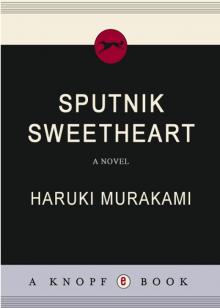 Sputnik Sweetheart
Sputnik Sweetheart Dance Dance Dance
Dance Dance Dance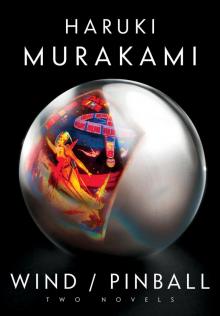 The Wind (1) and Up Bird Chronicle (2)
The Wind (1) and Up Bird Chronicle (2) Blind Willow, Sleeping Woman
Blind Willow, Sleeping Woman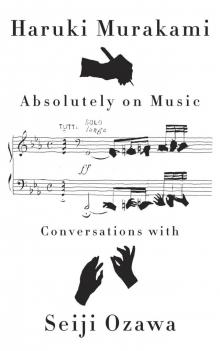 Absolutely on Music: Conversations With Seiji Ozawa
Absolutely on Music: Conversations With Seiji Ozawa Norwegian Wood
Norwegian Wood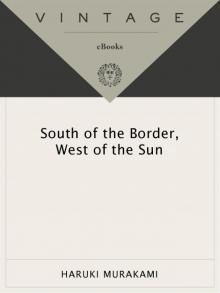 South of the Border, West of the Sun
South of the Border, West of the Sun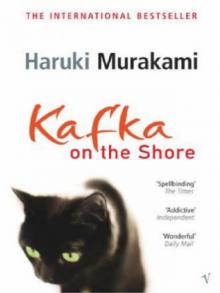 Kafka on the Shore
Kafka on the Shore Men Without Women
Men Without Women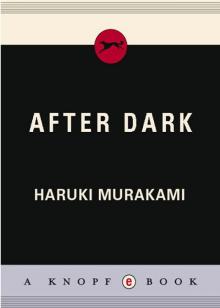 After Dark
After Dark Hard-Boiled Wonderland and the End of the World
Hard-Boiled Wonderland and the End of the World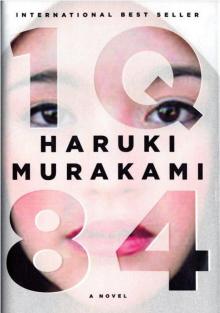 1q84
1q84 The Wind-Up Bird Chronicle
The Wind-Up Bird Chronicle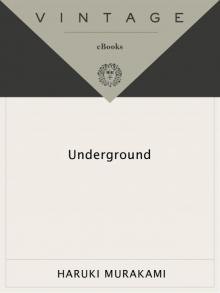 Underground: The Tokyo Gas Attack and the Japanese Psyche
Underground: The Tokyo Gas Attack and the Japanese Psyche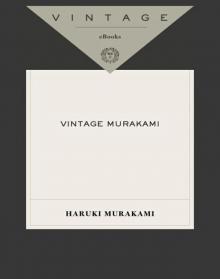 Vintage Murakami
Vintage Murakami The Elephant Vanishes: Stories
The Elephant Vanishes: Stories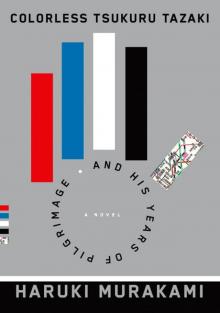 Colorless Tsukuru Tazaki and His Years of Pilgrimage
Colorless Tsukuru Tazaki and His Years of Pilgrimage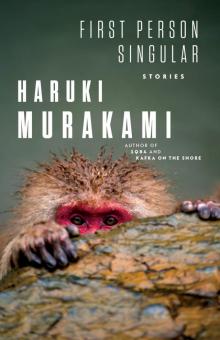 First Person Singular
First Person Singular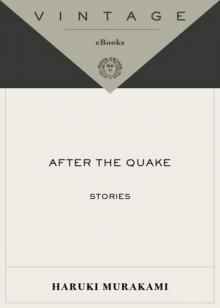 After the Quake
After the Quake A Wild Sheep Chase
A Wild Sheep Chase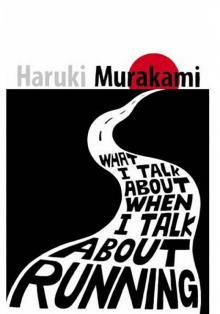 What I Talk About When I Talk About Running
What I Talk About When I Talk About Running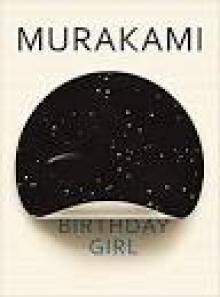 Birthday Girl
Birthday Girl The Elephant Vanishes
The Elephant Vanishes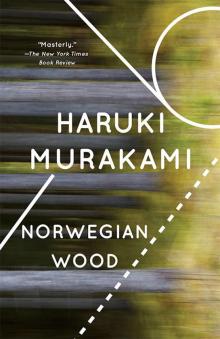 Norwegian Wood (Vintage International)
Norwegian Wood (Vintage International)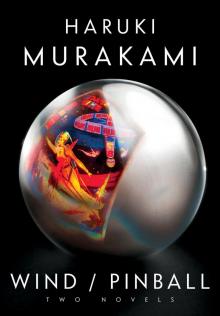 Wind/Pinball
Wind/Pinball Norwegian Wood Vol 1.
Norwegian Wood Vol 1. Underground
Underground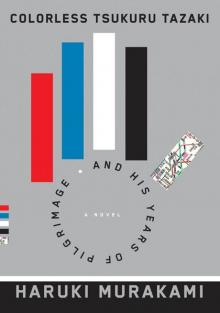 Colorless Tsukuru Tazaki and His Years of Pilgrimage: A novel
Colorless Tsukuru Tazaki and His Years of Pilgrimage: A novel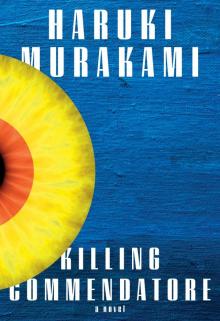 Killing Commendatore
Killing Commendatore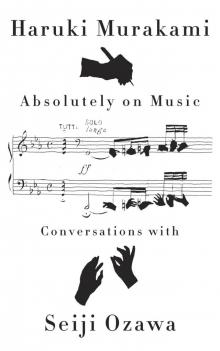 Absolutely on Music
Absolutely on Music